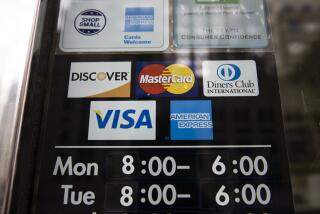Consumer credit in U.S. fell by most in three months
- Share via
Consumer credit in the U.S. declined in February more than anticipated, indicating Americans are reluctant to take on more debt without further improvement in the labor market.
Borrowing fell $11.5 billion, the most in three months, after a revised $10.6 billion January gain that was twice as much as initially estimated, the Federal Reserve said today in Washington. The decline in the February measure of credit card debt and non-revolving loans was worse than the lowest estimate in a Bloomberg News survey of 34 economists.
The drop was the 12th in 13 months and shows consumer purchases, which account for about 70% of the economy, will be limited until households become more optimistic about the recovery. Confidence to finance spending may be restored if employment keeps rising after a March payroll gain that was the biggest in three years.
“I don’t think we’re going to have the credit-fueled spending we had in the past,” said Gary Thayer, chief macro strategist at Wells Fargo Advisors in St. Louis. “A lot of consumers are deleveraging. They see excess borrowing as threatening.”
Stocks declined on concern the economic rebound may slow, with the Standard & Poor’s 500 Index falling from an 18-month high. The S&P 500 decreased 0.6% to 1,182.45 at 4:13 p.m. in New York. Visa, the world’s biggest payments network, slid 1.8% to $90.71 and credit-card issuer American Express Co. dropped 1.7% to $42.37.
Economists expected a $700 million decline in February consumer credit, according to the median estimate of economists in a Bloomberg survey. Projections ranged from a decrease of $10 billion to an increase of $5 billion.
Borrowing in January was revised from a $5 billion gain, the first in a year and reflecting a jump in federal non- revolving loans, such as student loans. Such borrowing increased an unadjusted $13.9 billion in January, previously reported as a $10.3 billion gain.
Revolving debt, such as credit cards, declined by $9.4 billion in February, the most in three months, according to the Fed’s statistics. Non-revolving debt, including loans for cars and mobile homes, dropped by $2.1 billion. The Fed’s report doesn’t cover borrowing secured by real estate.
As the economy and labor market improves, fewer Americans are falling behind in their credit card payments. Five of the six biggest U.S. credit-card lenders, led by Bank of America Corp. and JPMorgan Chase & Co., said late payments fell or held steady in February as the industry recovered from record losses.
The share of payments at least 30 days overdue, an indicator of future write-offs, dropped to 7.2% from January’s 7.4%, Charlotte, North Carolina-based Bank of America said. New York-based JPMorgan said late payments dropped to 4.67% from 4.75%.
In 2009, credit-card write-offs increased 59% to $89 billion from $56 billion in the previous year, according to R.K. Hammer Investment Bankers, in Thousand Oaks, California. Write- offs and delinquencies typically track the unemployment rate. The jobless rate has declined since reaching 10.1% in October, the highest since 1983.
More to Read
Inside the business of entertainment
The Wide Shot brings you news, analysis and insights on everything from streaming wars to production — and what it all means for the future.
You may occasionally receive promotional content from the Los Angeles Times.










